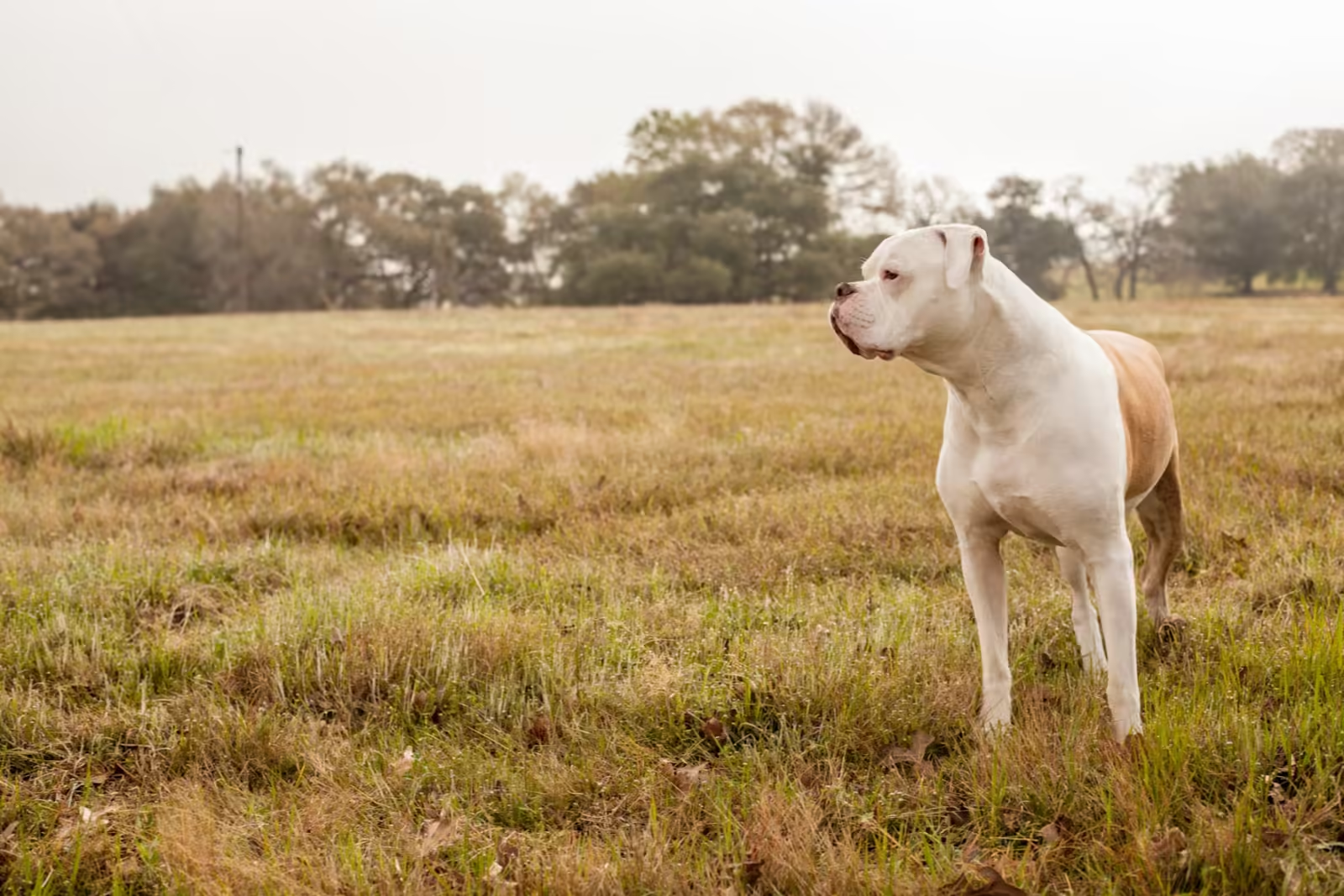The American Bulldog is a loyal, energetic, and strong breed known for its affection and loyalty to its family. While they can be powerful protectors, American Bulldogs are also wonderful family dogs when properly trained and socialized. This guide explores their temperament, training needs, and care essentials to ensure they thrive as loving and well-behaved companions.
Table of Contents
- Breed Overview
- Temperament and Personality
- Training Needs
- Exercise Requirements
- Nutrition
- Health Concerns
- Creating a Balanced Environment
- Final Thoughts
1. Breed Overview
- Breed Group: Working Group
- Height: 20 to 28 inches
- Weight: 60 to 120 pounds
- Lifespan: 10-15 years
- Coat Type: Short, smooth coat, minimal shedding
The American Bulldog originated in the United States, initially bred to help with farm work, herding, and guarding. With a strong and athletic build, they’re known for their strength and loyalty. American Bulldogs are versatile and can adapt to a range of activities, from work to companionship, but require consistent training and socialization.
2. Temperament and Personality
American Bulldogs are affectionate, energetic, and protective, making them both excellent family pets and loyal guardians.
- Loyal and Protective: They are devoted to their families and naturally protective, which makes them effective watchdogs.
- Energetic and Playful: American Bulldogs are active and love to play, making them great companions for families who enjoy outdoor activities.
- Confident and Determined: They are known for their confidence, and with proper training, they become well-behaved and respectful.
- Social and Friendly: When well-socialized, American Bulldogs are friendly with people and can be tolerant with other pets.
Tip: Early socialization helps them develop a balanced temperament and reduces any aggressive tendencies.
3. Training Needs
Training an American Bulldog is essential to ensure they are well-mannered, obedient, and able to interact positively with other pets and people.
- Positive Reinforcement: Reward-based training, using treats and praise, works best with American Bulldogs, as they respond well to positive interactions.
- Socialization from Puppyhood: Expose them to various people, animals, and environments early on to reduce fear or aggression later.
- Obedience Training: Focus on essential commands such as sit, stay, come, and leave it. These help establish boundaries and prevent dominance.
- Confidence Building: Use activities like agility training and interactive toys to build their confidence and engagement.
Training Tips:
- Consistency is Key: Maintain a consistent training routine to establish good behavior.
- Be Patient and Firm: Avoid harsh corrections, but stay firm and patient. Bulldogs can be stubborn and respond best to gentle guidance.
- Engage Their Mind: Keep training sessions fun and varied to hold their attention and prevent boredom.
4. Exercise Requirements
American Bulldogs are an active breed and require daily physical exercise to stay healthy and happy.
- Physical Exercise: Aim for 1 to 2 hours of exercise daily, which can include walking, running, and playtime in a secure yard.
- Mental Stimulation: Use puzzle toys, obedience training, and interactive games to keep them mentally stimulated.
- Structured Play: Activities like fetch and tug-of-war are excellent for Bulldogs, as they love to engage with their family.
Sufficient exercise helps manage their weight and reduces any tendency toward boredom or destructive behaviors.
5. Nutrition
Proper nutrition is vital for an American Bulldog’s health, energy, and well-being.
- High-Quality Protein: Bulldogs thrive on a diet rich in high-quality protein to support their muscular build.
- Joint Support: Consider foods or supplements with glucosamine and chondroitin, as these can support joint health, especially as they age.
- Portion Control: American Bulldogs have a tendency to overeat, so it’s essential to monitor their portions and avoid excessive treats.
- Hydration: Ensure they have access to fresh water, particularly after exercise or play.
Feeding Tip: Consult your veterinarian for specific dietary recommendations, as requirements can vary based on age, weight, and activity level.
6. Health Concerns
American Bulldogs are generally healthy but are prone to certain breed-specific conditions. Regular checkups and preventative care can help manage these risks.
- Hip and Elbow Dysplasia: Common in large breeds, this condition affects joint health and mobility.
- Brachycephalic Syndrome: Due to their broad skull and short muzzle, some American Bulldogs can have breathing issues, especially in hot weather.
- Skin Allergies: Bulldogs may develop skin sensitivities or allergies, which can cause itching and discomfort.
- Obesity: American Bulldogs are prone to weight gain if overfed or under-exercised, which can put stress on their joints.
Preventative Care: Regular vet visits, a balanced diet, and controlled exercise can reduce health risks. Joint supplements and keeping them at a healthy weight are also recommended to support joint health.
7. Creating a Balanced Environment
American Bulldogs thrive in a structured, balanced environment that provides clear boundaries, consistent training, and family interaction.
- Establish Rules Early: Set clear boundaries from a young age to help them understand acceptable behavior.
- Encourage Socialization: Continue socialization throughout their life to keep them comfortable with different people and environments.
- Safe Space: Create a comfortable resting area, such as a bed or crate, where they can retreat and relax.
- Engage with Family: American Bulldogs are family-oriented dogs that enjoy spending time with their loved ones. Be prepared to spend time interacting, training, and playing with them.
Tip: Avoid leaving an American Bulldog alone for long periods, as they can develop separation anxiety or destructive behaviors without sufficient interaction and engagement.
8. Final Thoughts
The American Bulldog is a loving, loyal, and energetic breed that thrives with the right training, care, and companionship. They make wonderful family pets and are devoted to their families, but they require consistent guidance, exercise, and mental stimulation to reach their full potential.
If you’re considering an American Bulldog, be prepared to invest time in their training and care. In return, you’ll have a devoted and protective companion who will bring joy, loyalty, and companionship into your life.











Leave a Reply